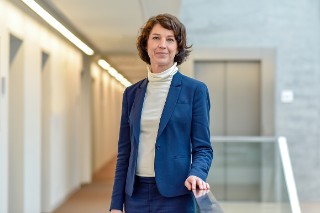Materials scientist Prof. Dr. Erica Lilleodden has been appointed as director of the Fraunhofer Institute for Microstructure of Materials and Systems IMWS. She takes over this post from Prof. Dr. Matthias Petzold, who had successfully led the institute on an interim basis since October 2019. With its expertise in microstructure diagnostics and microstructure-based materials design, the institute in Halle (Saale), Germany, makes important contributions to the optimization of materials and the development of new materials.
more infoPress Releases
-
-
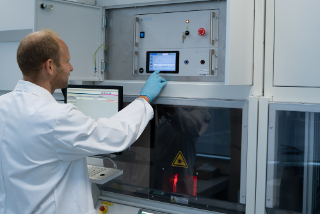
The next generation of solar cells will contribute significantly to a sustainable power supply on a global scale. For state of the art technologies such as PERC (Passivated emitter and rear cell, a team from the Fraunhofer Center for Silicon Photovoltaics CSP has now researched an active mechanism that can be used to optimize high-performance cells.
more info -
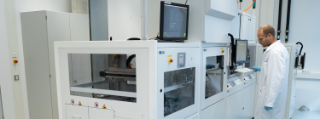
Automated and measurement-based process control as a new path to a photovoltaic industry 4.0: The Fraunhofer Center for Silicon Photovoltaics CSP aims to drive technological developments in international photovoltaics for competitive production processes from Germany with an industry-oriented platform that offers the possibility of interplay between statistical quality control and new approaches to data-based process analysis.
more info -
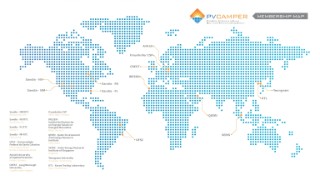
More data, more collaboration, more opportunities for photovoltaics: A new platform for investigating the performance and reliability of solar systems in different environments and climate zones worldwide will provide an important basis for an even broader and more efficient use of solar energy. The Fraunhofer Center for Silicon Photovoltaic CSP in Halle (Saale) is among the founding members of the recently launched PV CAMPER platform.
more info -
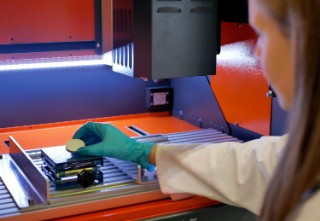
Laser-induced breakdown spectroscopy (LIBS), an innovative optical surface analysis technique, opens up a broad range of applications. This measurement method enables the elemental composition of solid, liquid or gaseous substances to be determined in a contactless manner. At the Fraunhofer Center for Silicon Photovoltaics CSP in Halle (Saale), LIBS technology combined with powerful evaluation algorithms is used to carry out precise and extremely rapid multi-element analyses. In a study published recently in which fluorine loss during the melting of bioactive glasses and glass-ceramics was examined, technicians at the Fraunhofer CSP demonstrated the effectiveness of LIBS.
more info -
In the project entitled Reliability Design, the Fraunhofer Institute for Microstructure of Materials and Systems IMWS together with other partners plans to develop an efficient and trustworthy method for predicting the reliability and working life of inverters for use in photovoltaic and battery storage systems. The method could make a significant contribution to reducing the costs of generating electricity.
more info -
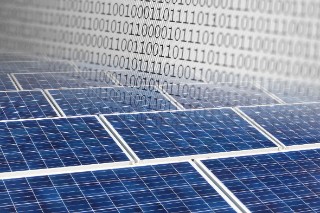
The Fraunhofer Center for Silicon Photovoltaics CSP presents innovative contributions to quality control in the solar industry at the Intersolar trade fair from 15.-17. May 2019 in Munich. Visitors will be able to experience a mobile test device for the PID susceptibility of solar modules, get to know new approaches for the reliable design of lightweight modules and find out how to optimize complex processes, for example, for the evaluation of yield by evaluating measured data.
more info -
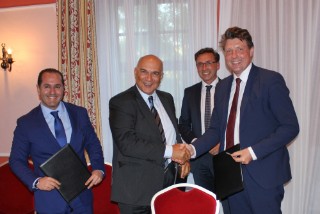
Mainstreaming Green Hydrogen and Green Ammonia as raw materials for the fertilizer industry: With this goal in mind, the Fraunhofer Institute for Microstructure of Materials and Systems IMWS in Halle (Saale) and the OCP Group of Morocco, the world's largest exporter of phosphates, will cooperate even more closely in the future. The two institutions signed a Memorandum of Understanding to work jointly on solutions for a sustainable fertilizer industry.
more info -
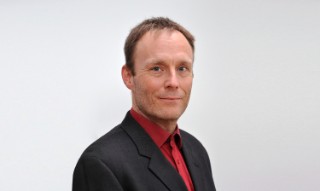
Prof. Ralph Gottschalg is to become the new head of the department of reliability and technology for grid parity at the Fraunhofer Center for Silicon Photovoltaics CSP in Halle (Saale). The physicist comes from Loughborough University/England. At the same time, Gottschalg will take up a professorship in the field of photovoltaic energy systems at the Anhalt University of Applied Sciences.
more info -

Aesthetic and efficient at the same time: The outstanding design of the “SOLAR.shell” solar façade developed by architects from the Leipzig University of Applied Sciences (HTWK Leipzig) and scientists from Fraunhofer CSP means that it generates up to 50 percent more solar power than conventionally installed solar modules – and it looks good too.
more info -
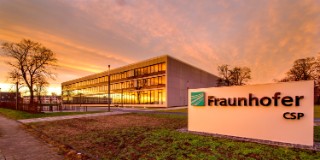
A proficient competence centre for photovoltaics and important driving force for the economy: The Fraunhofer Center for Silicon Photovoltaics CSP in Halle (Saale) was established 10 years ago. The research establishment’s anniversary was celebrated today as part of an international symposium. Sachsen-Anhalt’s Prime Minister Dr. Reiner Haselhoff and many partners from commerce, politics and science were amongst the well-wishers. At the same time, the ground was symbolically broken for a new solar park.
more info -
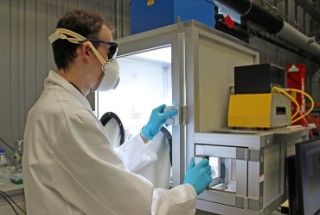
Morocco, Saudi Arabia, Dubai: New solar parks are emerging in many deserts. However, Pollution of the photovoltaic modules with sand and dust presents a challenge. At Fraunhofer Center for Silicon Photovoltaic CSP, a process has been developed together with partners to simulate this pollution behavior in the laboratory - an important prerequisite in order to optimize the materials used and thus the yields. For his research on this issue Klemens Ilse from Fraunhofer CSP received the Best Student Paper Award from the IEEE PVSC 44.
more info -
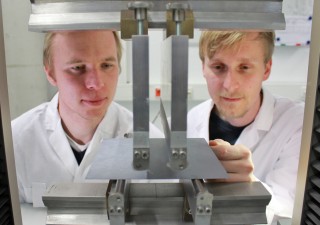
The Fraunhofer Center for Silicon Photovoltaic CSP has developed a DIN SPEC together with the Leipzig University of Applied Sciences (HTWK Leipzig), regional industry partners and the German Institute for Standardization (DIN) for the strength testing of photovoltaic wafers. The standardized process facilitates quality control in the solar industry.
more info -
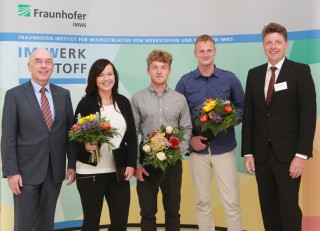
Rico Meier has been honored with the 2017 Material Prize 2017 for the ultrasonic evaluation of mechanical properties of copper strips for photovoltaic modules in critical areas of the production chain. The 33-year-old physicist received the prize worth € 1,500 in the course of the board of trustees' meeting of the Fraunhofer Institute for Microstructure of Materials and Systems IMWS in Halle (Saale). His investigations allow the destruction-free production of copper bands in the production chain and represent an increase in quality and continuity.
more info -
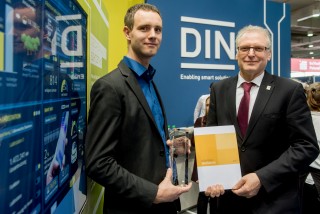
For the development of a test method for a frequently occurring defect in silicon solar cells, Dr. Volker Naumann from the Fraunhofer Center for Silicon Photovoltaics CSP received the DIN Innovation Award. The 32-year-old physicist was handed over the prize endowed with 3,000 euros at the Hannover Messe yesterday. His work helps to improve the lifetime and the efficiency of solar modules. The test method that he developed provides the basis for a DIN standard.
more info -
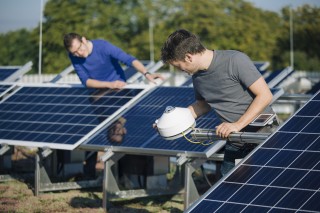
More than 1.5 million solar systems are already installed in Germany. And the trend is increasing. How good is the quality of the systems on German roofs? The Fraunhofer Center for Silicon Photovoltaics CSP want to determine this for the first time ever, together with the power supply company E.ON and the ZAE Bayern - in a scientific study based on the most extensive data set that has ever existed on photovoltaic systems. The results will help to further improve the reliability and efficiency of photovoltaic systems.
more info -
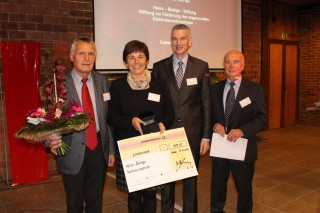
The physicist Dr. Susanne Richter has received the Young Scientist Prize of the Heinz-Bethge-Stiftung foundation for applied electron microscopy. The 32-year old researches at the Fraunhofer Center for Silicon Photovoltaics CSP and received the award worth 500 euros during the foundation’s annual meeting on 17 November 2016 in Halle. The results of her research could help to develop further the reliability of solar cells and high-efficiency solar cell concepts.
more info -
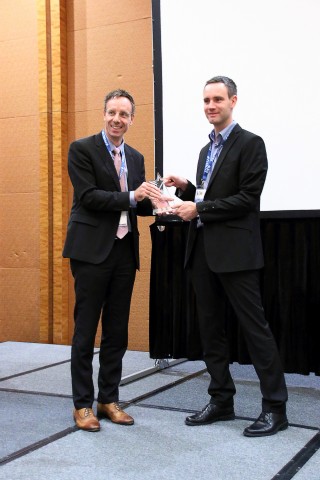
Dr Volker Naumann of the Fraunhofer Center for Silicon Photovoltaics (CSP) was singled out for the Best Poster Presentation in the subject area of photovoltaic modules at the PVSEC conference in Singapore. Dr Naumann presented the PIDcheck, a mobile device that can determine the susceptibility of solar modules already installed in the field to potential-induced degradation (PID). The defect is one of the most frequent causes of performance losses in photovoltaic modules with crystalline silicon solar cells.
more info -
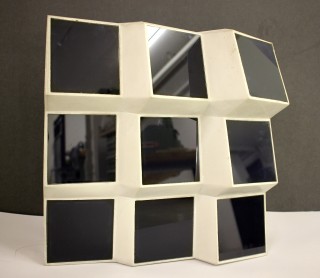
Structures become safer, can be erected and run in a more environmentally friendly way and can be designed in completely new shapes: That is the objective of C3, Germany’s largest building research project. The planned key is carbon concrete, which offers many new opportunities as a building material. The Fraunhofer Center for Silicon Photovoltaics CSP in Halle, one of the C3 project partners, wants to use concrete to produce solar electricity.
more info
 Fraunhofer Center for Silicon Photovoltaics CSP
Fraunhofer Center for Silicon Photovoltaics CSP